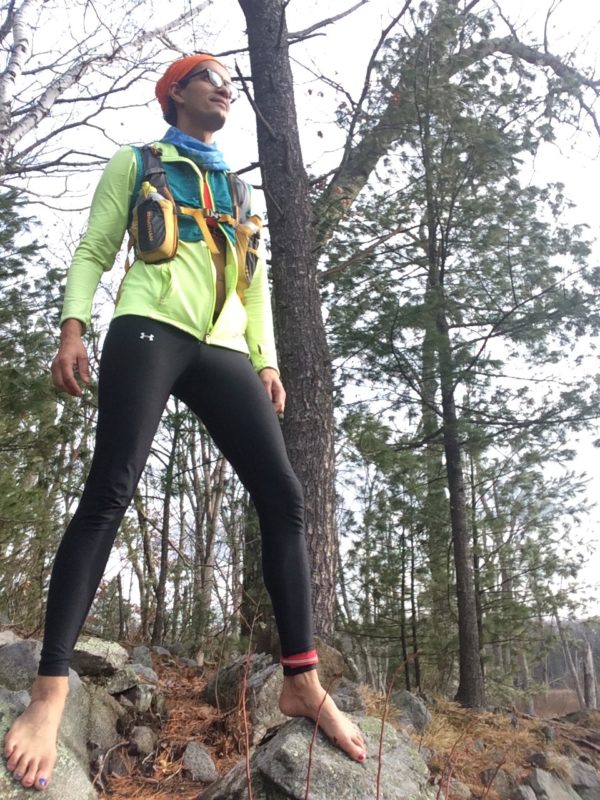Intersex Activist &
Ultra Runner Su Mittra:
‘I Won’t Hide Who I Am’

By: Su Mittra
The most accepting group of active people that I have ever found has been the ultra-running community. Ultras are 30+ mile races that inevitably tear apart one’s psyche.
During one such ultra, on a rainy night in May, I had travelled 40 miles over 20+ hours on my bare feet. It was pitch black on this Vermont mountain except for a circle of white light from my headlamp. The cold moist air was grasping around my neck and I felt that I was on the verge of having a panic attack. But I needed to keep running to the next checkpoint, even though all I really wanted to do was lay down on the forest floor and sleep. The stress I endured from pushing mile after mile caused me to have an emotional breakdown.
Working on instinct alone, my legs kept pushing me forward, an action that I barely noticed. When I made my final descent down the mountain, I knew there would be an aid station right there around the bend. I prayed that somebody was manning it on that dark night, someone to interact with and help ground my ragged mind. But being an LGBTQIA athlete, I often worry if the person at the aid station will judge me, or treat me differently or inappropriately for the way that I am and how I dress. Most LGBTQIA people have seen some form of discrimination or hatred directed at them, so there is always a shield up because of an anxiety that we will find intolerant people.
When I got to the aid station I found two women standing by a white tent, and I could tell they were just staring at me—maybe judging. Part of me wanted to keep going, but I really needed a break.
I picked up an Clementine from the table, kept my head down, and sat on a nearby camp-chair. Feeling eyes on me and hearing only silence, I focused on eating, and then heading out again. But having been in the cold my fingers couldn’t pierce the peel and just began weeping—I felt helpless.
Just then one of the women kneeled down in front of me, took the fruit, and said while smiling, “Here, let me help you.” As she peeled she continued, “We’re all really amazed that you’re doing this race barefoot! Everyone that’s come in has talked about you. What else can we get for you? Water? Food?” The other woman echoed similar sentiments, and within a few minutes I was smiling and laughing, and having a good time.
This type of race environment is unique because both runners and volunteers are looking out for everyone’s well being. In this community, people accept me for who I am, not how I look, and they want to see me survive & succeed.
Amongst sports fans, there is a camaraderie in challenge. Ultra runners come together from different backgrounds to test themselves as well as support the next person. People who don’t know each other at the start of a race become the closest of friends by the end. Through the journey of challenge our social barriers are discarded, and our true human selves are revealed.
Before I was completely comfortable with myself—prior to coming out—the mental pain of having to live a lie was harder than anything I have ever encountered during ultra. My real life stress of being closeted never relented, and I couldn’t take a day off. Each morning I woke up believing that I was not natural, since I didn’t act like the men or women that I knew, I didn’t dress the way “normal” people dressed, and I only received looks of confusion or laughter from other people as I desperately tried to fit in. The burden of being different from the world around me was frightening, taxing, and can kill a person.
Had I not found this community, my life would have been much different. I would have very little self-confidence—a fraction of the person that I am now. Spending time outside would involve a fear of being ridiculed, criticized, or attacked. I wouldn’t put myself in the spotlight, and I certainly would not have started a running group that has helped others find a place in this world.
In 2011, I started the Davis Square Runners (DSR), because I couldn’t find a group that fit my needs. My hope was to create a space where new people would be welcomed. To that end, the group has a few simple rules:
- We are inclusive and welcoming to all.
- We regroup periodically for slower people during group runs.
- No judgements or criticisms about others.
As the main leader, I know I set the tone for the group. And being a part of the LGBTQ community, I wear that badge proudly by not hiding the way I dress or the type of person that I am. In my experience, the people in this group have helped me become more accepting of myself by never focusing on my differences. I want all people to feel welcomed and included.
Want to receive stories like this in your inbox? Sign up here.